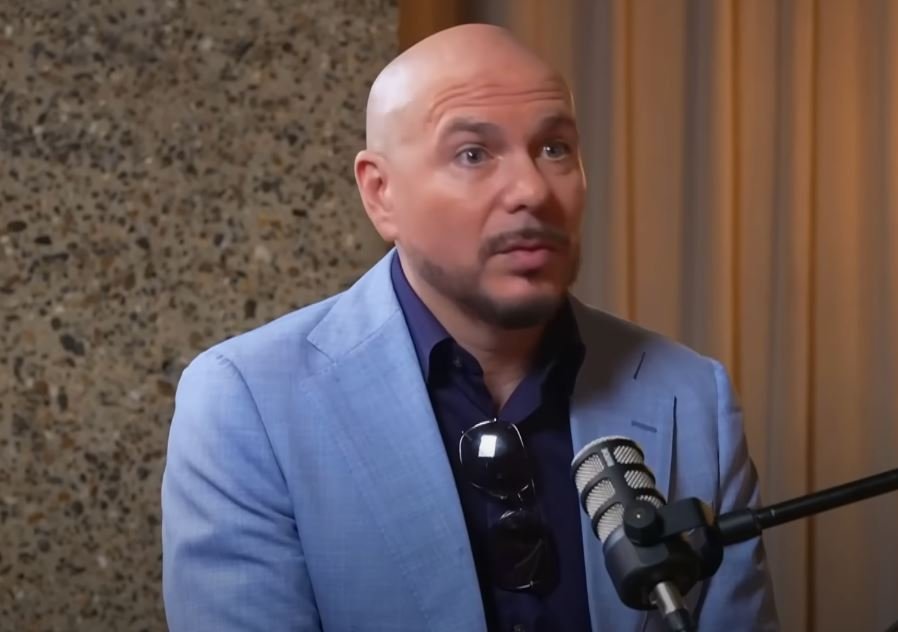
Pitbull has developed a remarkably resilient presence in music, branding, and philanthropy over the last 20 years. His estimated net worth of $100 million is the result of a remarkably successful strategy that combines strategic entrepreneurship with unrelenting musical output. Pitbull kept his engine running, releasing hit after hit and securing business deals that subtly transformed him into a cultural tycoon, whereas many artists stall after one chart-topping single.
Pitbull was born to Cuban immigrants and raised in Miami. His early years were filled with upheaval, including family disarray, being kicked out of the house, and even a few run-ins with the law. He stood out, though, because of his unwavering determination, which was honed by a very personal desire to succeed. He eventually signed with TVT Records after focusing his energies on music, and in 2004 he made his breakthrough with “Culo.” What came next was the creation of an empire in addition to a music career.
Pitbull | Personal and Career Highlights
| Category | Details |
|---|---|
| Full Name | Armando Christian Pérez |
| Stage Names | Pitbull, Mr. 305, Mr. Worldwide |
| Birthdate | January 15, 1981 |
| Birthplace | Miami, Florida, USA |
| Nationality | Cuban-American |
| Profession | Rapper, Singer, Businessman, Actor |
| Active Since | 1998 |
| Estimated Net Worth | $100 Million (as of 2025) |
| Major Hits | “Give Me Everything,” “Timber,” “Feel This Moment,” “Hotel Room Service” |
| Business Ventures | Voli 305 Vodka, SiriusXM Globalization Radio, Trackhouse Racing |
Pitbull developed a recognizable sound by working with musicians such as Christina Aguilera, Jennifer Lopez, and Kesha. His image was carefully chosen, and his hooks were definitely catchy. He developed an image based on self-assurance, well-tailored suits, and worldwide appeal rather than disobedience or street drama, in contrast to many of his peers. He transitioned from Latin hip-hop to mainstream pop without losing his cultural edge, which made the change especially inventive.
Pitbull’s business acumen has been particularly important in increasing his wealth. He converted his prominence into steady income streams by utilizing endorsements with companies like Bud Light, Kodak, and Dr. Pepper. One of the main pillars of his brand extension was the introduction of his vodka line, Voli 305. In contrast to other celebrity endeavors, he contributed more than just his name; he also took an ownership stake and assisted in setting the creative direction.
He created SiriusXM’s Globalization Radio, a station that features multilingual celebrations of international hits, through strategic partnerships. In addition to being culturally appropriate, this was also very adaptable in drawing in a larger, multilingual audience. He established himself as a unifying force in entertainment by embracing mainstream platforms and promoting Latin identity.
This diversified approach is reflected in his earnings. Pitbull’s documented income totaled $182 million between 2007 and 2019. He made $35 million in 2018 alone, making him one of the highest-paid rappers in the world. With arena-packed performances across continents and headlining roles on well-known tours like Britney Spears’ Piece of Me and Enrique Iglesias’ Sex and Love, touring became a major source of his income.
His investments have significantly increased over time and have expanded outside of the music industry. His investment in restaurant chains such as Cilantro Taco Grill and his involvement with Trackhouse Racing demonstrate a deliberate attempt to broaden his brand’s reach. Even though they are largely unknown, his real estate transactions point to a long-term strategy for asset diversification and wealth preservation.
However, Pitbull’s dedication to community uplift is what makes his success so noteworthy. He has been working to reduce educational inequality with his SLAM! charter schools for more than ten years. With a 96% graduation rate, these tuition-free institutions in Miami, Las Vegas, and Atlanta provide an incredibly effective example of how to blend social responsibility with celebrity influence.
Pitbull didn’t wait for publicity during Hurricane Maria’s devastation; he flew his own private jet to take cancer patients from Puerto Rico to hospitals on the mainland. These kinds of deeds, which are noticeably underreported, reveal a subtle but significant legacy that enhances his business savvy.
Pitbull’s private life is still mostly hidden from the general public. Despite having four children, he rarely discusses them because he would rather keep his family out of the spotlight. Celebrities like Pharrell and Sia have employed this deliberate privacy as a tactic to draw attention to their art and deeds rather than their drama.
Pitbull has remained composed in the face of criticism, frequently unjust, directed at his lyrics or visual branding. He continuously makes use of his position to promote freedom of speech, anti-communist views on Cuba, and educational empowerment. Released during the COVID-19 pandemic, his song “I Believe That We Will Win” functioned as both a motivational anthem and music. The idea that purpose can coexist with profit was furthered by the song’s donation of all proceeds to organizations like the Anthony Robbins Foundation and Feeding America.
Pitbull’s significance hasn’t decreased in recent years due to the rise in popularity of new artists like Bad Bunny and Karol G; rather, it has simply changed. He is now more than just a party anthem machine; he is a representation of thoughtful development and someone who has exceptional clarity in navigating the changing tides of the industry. His capacity to stay current while gaining broader sway is especially helpful for Latin musicians looking to break into more markets.
